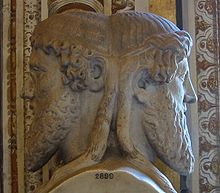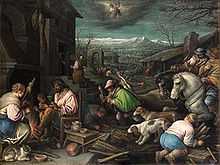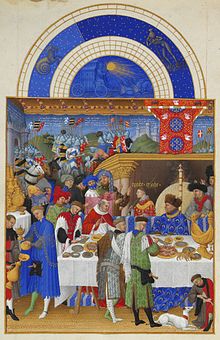January
![]()
This article is about the month of January. For the stage play, see January (Radichkov).
January (Latin mensis Ianuarius), in parts of Upper Germany moreover and in Austria and South Tyrol almost exclusively January, is the first month of the year in the Gregorian and Julian calendars. It has 31 days. Outdated name forms are Hartung, Hartmonat, Schneemonat, Eismond, Wintermonat or Wolfsmonat.
It is named after the Roman god Janus, who is depicted with two faces. He is considered the god of beginnings and endings, entrances and exits, doors and gates. In the official year of the Roman calendar, Ianuarius was originally the eleventh month and had 29 days. With the change of the beginning of the year from March 1 to January 1 in 153 BC, Ianuarius became the first month of the calendar. After Caesar's calendar reform, the month was extended to 31 days in the Julian calendar from 45 BC by inserting two extra days. Under the emperor Commodus the month was renamed Amazonius, but after the emperor's death it was given back its old name.
Since then, January always begins with the same weekday as May of the previous year. In leap years also with the same weekday as April and July of the same year, otherwise like October (see Doomsday method).
Which week is considered the first calendar week of the new year depends on the day of the week of January 1. If it falls on Monday to Thursday, it belongs to the first calendar week of the new year (ISO 8601), since this week then has at least four days in the new year.

Janus statue

January, by Leandro Bassano, 1595/1600
January
The form jennare > Jänner was already adopted in Middle High German times from the Late Latin variant Ienuarius, to which Spanish Enero or Italian Gennaio and French Janvier also go back, while Januar is a learned borrowing from the 18th century from classical Latin (mensis) Ianuarius. In the 19th century, the term Jänner was common even in Würzburg, which was situated far north within the Upper German area, on an equal footing with Januar, as numerous official announcements prove. In 1817, for example, the Intelligenzblatt für das Großherzogthum Würzburg (Intelligence Gazette for the Grand Duchy of Würzburg) stated that "next Monday, January 20, in the afternoon at 2 o'clock" grain could be auctioned at the Würzburg Rentamt. The word January subsequently replaced Jänner, first in the north of the German-speaking world, and eventually became established almost everywhere. Even in the south, in Bavaria and in Switzerland, Jänner is only rarely used in written language.
In other parts of the Upper German-speaking world, however, as in Austria and South Tyrol, Jänner is still the common name for the first month of the year, both in colloquial and written language and according to the Austrian dictionary. In contrast, the use of the term Feber for the second month is becoming rarer. Contrary to common usage in Austria, some Austrian editors substitute the word Jänner for January in deference to the entire German-speaking world and its book market. In Austria, the word January is hardly used.

The month of January in the Book of Hours Très Riches Heures
Holidays
New Year's Day on 1 January is a public holiday in all German-speaking countries. In Baden-Württemberg, Bavaria, Saxony-Anhalt, the whole of Austria and some Swiss cantons, Three Kings' Day on 6 January is also recognised by law as a public holiday or day of rest. In other parts of Switzerland, Berchtold's Day on 2 January is a day off. For other holidays and commemorative days, see Category:List (holidays) and List of commemorative and action days.
Questions and Answers
Q: What is the first month of the year?
A: January (Jan.) is the first month of the year in the Julian and Gregorian calendars.
Q: How many days are there in January?
A: January has 31 days.
Q: On which day does January begin in common years?
A: In common years, January begins on the same day of the week as October.
Q: On which day does January begin in leap years?
A: In leap years, January begins on the same day of the week as April and July.
Q: On which day does January end in common years?
A: In common years, January ends on the same day of the week as February and October.
Q: On which day does January end in leap years? A: In leap years,January ends onthe same day ofthe week as July.
Search within the encyclopedia